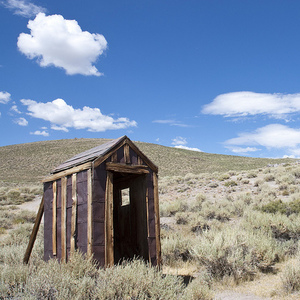Many people in Dakar, Senegal, choose the least expensive way to dispose of the raw sewage that collects in their septic systems. The result is that sewage contaminates their neighborhoods and makes people sick. The healthier option is more expensive, and it stays expensive because sewage collection companies have agreed not to compete with each other. They set a price that makes the cost too high for most people to pay. Listen to learn about how an economist implemented a new program to bring down prices and clean up the local environment.
Listen to the story
AILSA CHANG: The laws of economics works smoothly except when it comes to cartels. Cartels happen when businesses get together and fix prices. Think OPEC for oil or De Beers for diamonds. Cartels hurt competition, drive up prices. And that’s generally bad for consumers. Robert Smith from our Planet Money team has a story of a cartel in Dakar, Senegal – a dirty and stinky one – and how a team of economists fought back.
ROBERT SMITH: It is a cartel that deals exclusively with raw sewage. And the story starts in a typical bathroom. Like in lots of places in the world, it is pretty common in Senegal for toilets to flush into a septic tank that needs to be emptied every so often. And there are two ways to do it. Option one, the cheap option, is this guy.
JIBI: My name is Jibi. I live in Senegal. I am a baay pelle.
SMITH: Baay pelle means Father Shovel because that’s how he does the dirty work.
You’re the father of this shovel? This is your son.
JIBI: (Laughter).
SMITH: Father Shovel gets into the septic tank with his shovel and bucket, and then he empties the bucket into a hole in the street. Obviously this is not healthy. It makes people sick. There is a better option, though. A giant vacuum truck can come to your house and take the sewage to a treatment center. They’re called toilet suckers, driven by Father doesn’t-really-need-a-shovel.
CHEIK GUEYE: Hello. My name is Cheik Gueye.
SMITH: And here’s the cartel part. If you want to hire a toilet sucker, you have to come to a parking lot like this one, where all the drivers are just hanging out next to their idle trucks. And when one of them gives you a price, you cannot walk around and try and get a better deal from the others. Even though they’re separate businesses, they have decided as an association not to compete and to keep prices high – twice as high as paying Father Shovel to dig out the tank. And so people here will often use the sewage-in-the-street option just to save money. The government of Senegal decided to call in an economist.
MOLLY LIPSCOMB: My name is Molly Lipscomb. I’m an associate professor at the University of Virginia.
SMITH: Lipscomb brought in a team of researchers in the group Innovations for Poverty Action. She knew that they had to find a way to get the truckers to start trying to beat each other on price. And she thought, well, they do all have cellphones, and maybe she could set up a system where people could order one of the trucks by text message.
Do you hate it when people call this Uber for poop?
LIPSCOMB: (Laughter) No. No. You know, Uber is a very well-functioning market, and I think they’ve done great things for transportation. So if this is Uber for poop, that’s great.
SMITH: The team set up a call center to run a sort of auction. If you lived in Dakar and your septic tank was overflowing, you could call this phone number, and the job offer would be texted to a dozen different drivers, seeing who would offer to do it for the least amount of money. One of the researchers, Josh Deutschmann, said at first the truckers would send back these outrageous prices.
JOSH DEUTSCHMANN: But then they would start seeing, OK, this is the price that wins in this neighborhood; maybe I can undercut that a little bit next time. And just watching sort of the real-time process of competition unfolding over the space of weeks and months was really, really exciting.
SMITH: The truckers were making less money on each job, but they were getting more work. More people in Dakar were choosing a cleaner option. One of the truckers I talked with, Cheik Gueye, says he wasn’t happy about losing the high prices, but still, he sent in his bids.
GUEYE: (Through interpreter) Even though we used to be united – but now it’s a competition. And you need to work hard in order to get something in your business.
SMITH: The experimental call center is now being taken over by a private company. They want to expand it to all of Dakar because, as the saying goes, competition happens. Robert Smith, NPR News.
 © 2018 National Public Radio, Inc. Used with the permission of NPR. All rights reserved.
© 2018 National Public Radio, Inc. Used with the permission of NPR. All rights reserved. Vocabulary
- sewage – waste water and excrement
- septic system – a way of collecting sewage in an underground tank at the site where the waste is generated
- cartel – an association of sellers (of a good or service) that keeps prices high and discourages competition
- innovations – new methods or ideas
- undercut – offer goods or services at a lower price than a competitor
Listening Comprehension Questions
- What are the two ways to dispose of sewage in Dakar?
- Why do people choose one way over the other?
- How did the cartel protect pricing in the sewage removal business?
- How did the government intervene, and what was the goal of the intervention?
- What have been the effects of the intervention?
Discussion Themes
- What are the benefits and drawbacks of the government’s action concerning breaking up a cartel in the waste collection business?
- Based on what you heard, would you recommend that the government’s plan be implemented elsewhere? Why or why not?
Teacher’s Guide
Introduce the story: In this audio story, you will hear about how people in Dakar deal with sewage and how local companies agreed to fix prices. But you’ll also hear how the government intervened to make a cleaner disposal option more affordable and broke up the cartel. Listen to learn about how competition among sellers can affect prices and change people’s way of life.
Active listening supports:
- The Cause and Effect worksheet will help students identify key ideas as they listen to the audio story.
- The Language Identification organizer allows students to follow along and track important phrases while listening to the story.
Reflect on the story: Encourage students to think about the story as an example of the economic concept of competition. Have them consider who benefits when the cartel is disbanded, and who, if anyone, does not benefit.
Paired Text: Use the Bloomberg article Quicktake: Cartels to pair with this audio story. This explanatory text provides a different way of thinking about cartels. Have students compare and contrast the perspective on cartels expressed in the audio story with the perspective expressed in the article.


